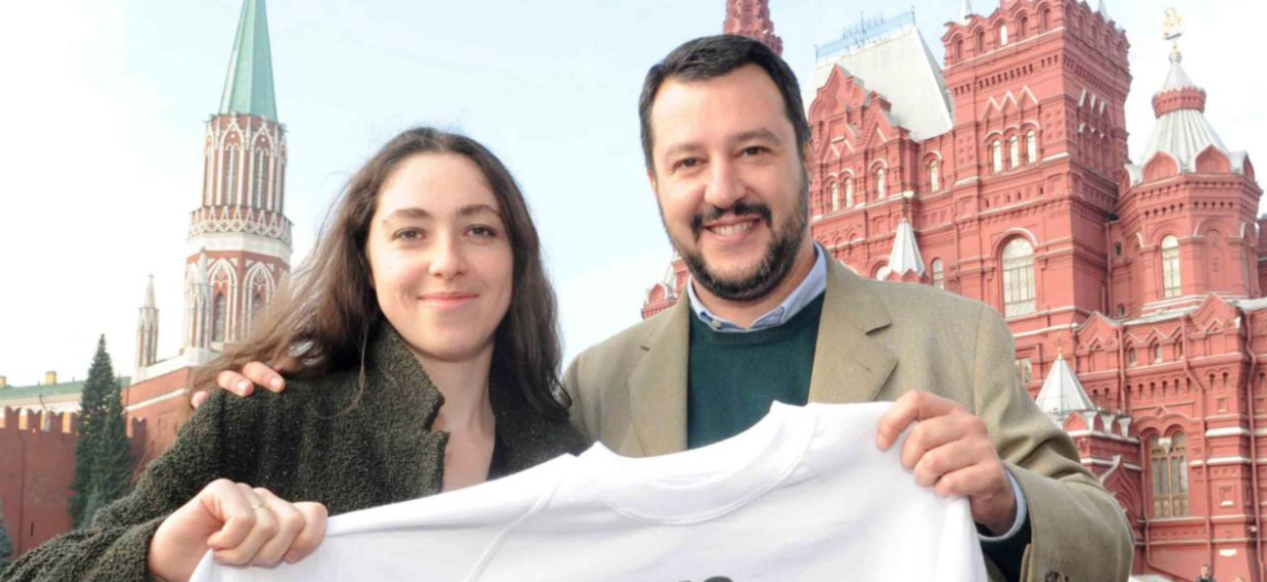Foreign Affairs Upstage Policy, Stir Up a Hornet's Nest
ROME -- In a globalized world it is hardly surprising that foreign affairs occupy more political space than ever before. Forget the new government "contract," with its policy bullet points. The brave new government is headed by a relatively inexperienced Prof-Premier Giuseppe Conte, who misplaced his notes for his debut in Parliament Wednesday. For Conte, flanked by powerhouse Matteo Salvini of the Lega and, to lesser extent, by Luigi Di Maio of the Movimento 5 Stelle, the enormous challenges weigh in from all sides: NATO, the European Union, the US, and, regarding immigration, North Africa.
In particular, addressing Parliament Wednesday, neo-Premier Conte stirred up a hornet's nest when he declared, "The government wants to promote an opening toward Russia, and a revision of the system of sanctions." Speaking in favor of the government's proposal to lift the sanctions was Guido Crosetto of the rightwing party Fratelli d'Italia, second-in-command to Giorgia Meloni. "We must abolish the sanctions because strategically we cannot just leave Russia in the arms of China. On NATO's part it is a strategic error to insist upon antagonizing Moscow," he told reporters Wednesday in Parliament.
These economic sanctions were invoked by Angela Merkel in July 2014 as an alternative to military action after Russia invaded and annexed the Ukrainian Crimea. They were applied against Russia by the EU, Canada, the US and other nations and are, to quote the US magazine "Foreign Policy", "a response to Russia's behavior in violation of international law and its own commitments."
After four years the consequences for Russia include capital flight, a drop in value of the ruble, lost access to foreign financing and hence a draining of Russian foreign exchange reserves, and a decline in the country's GDP. And last March 12, just six days after the Italian general elections which propelled Salvini and Di Maio into government for the first time, the EU announced that those sanctions are extended for another six months, or until Sept. 15.
Among other things, the sanctions -- which include travel restrictions and asset freezes against 38 companies and 150 individuals in Russia -- suspend credit financing for exports to Russia, financing of its economic development projects, and the "sharing of technology for shale projects that can produce oil in the Russian Federation," in the words the U.S. State Department.
Will a lifting of the sanctions actually happen? It is too soon to know, at least not until the European Council (the institution in Brussels that defines EU political priorities) meets June 28-29 in Brussels. For NATO, "We must maintain a political dialogue with Russia, but the economic sanctions are important," said Jens Stoltenberg in Brussels, secretary-general. And speaking for the US was ambassador to NATO Kay Bailey Hutchinson: "On Russia I think that the sanctions must be maintained until Moscow changes its behavior -- otherwise we will be giving a bad signal to the Kremlin."
The debate took a nasty turn, when Hungarian-American financial mogul George Soros, 87, speaking at the 13th annual Economics Festival at Trento June 3, declared that, "I am very concerned at the new government's moving closer to Russia.... There is a close relationship between Matteo Salvini and Putin. I don't know if in effect Putin finances Salvini's party, [but] the Italian public has the right to investigate the question, the right to know if Salvini is on Putin's pay roll," Soros said. To this a shocked former Interior Minister Marco Minnitti said, "I surely hope that no one ever took a single ruble for financing from the Russians."
Salvini flatly denies having accepted Russian funding for his party. "Shameful! I never took a lira, a euro or a rouble from Russia. I consider Putin one of the foremost statesmen, and I am ashamed of the fact that in Italy they invite to speak a speculator without scruples like Signor Soros."
How does the public feel about this? In a nationwide survey of the popularity of a trio of international leaders -- Vladimir Putin, Angela Merkel, Donald Trump -- conducted by Demos & Pi, with almost 6,000 interviewed, Putin was favored by only 39% nationwide. Supporters of Forza Italia were Italy's most enthusiastic about Putin (61%), notoriously a friend of Berlusconi. Voters from Meloni's tiny Fratelli d'Italia (54%) and Salvini's Lega were next (53%) in admiration for Putin, decidedly less popular among voters for Di Maio's M5S (39%).
Nationwide, at 51% Angela Merkel was the most popular of all, and Donald Trump, the least, at 23%. On the other hand, rightist party respondents who said they admire Trump were Fratelli di'Italia (49%), Salvini's Lega (41%) and former Premier Silvio Berlusconi's Forza Italia (38%).
Needless to say, Russian sanctions are not the only Italian situation that troubles Europe. Moving closer to home, the Italian economy had a GDP surplus before interest payments of 1.7%, and so "Italy is not particularly vulnerable to a run on its bonds by foreign investors," according to the "Economist". However, the magazine's editorial writer went on to say, Italy has "one of Europe's worst-performing economies," and the new government's proposals for a flat tax and for a universal basic income provision are risky: "Italy's real problem is the debilitating combination of chronically low growth and high public debt."





































i-Italy
Facebook
Google+
This work may not be reproduced, in whole or in part, without prior written permission.
Questo lavoro non può essere riprodotto, in tutto o in parte, senza permesso scritto.